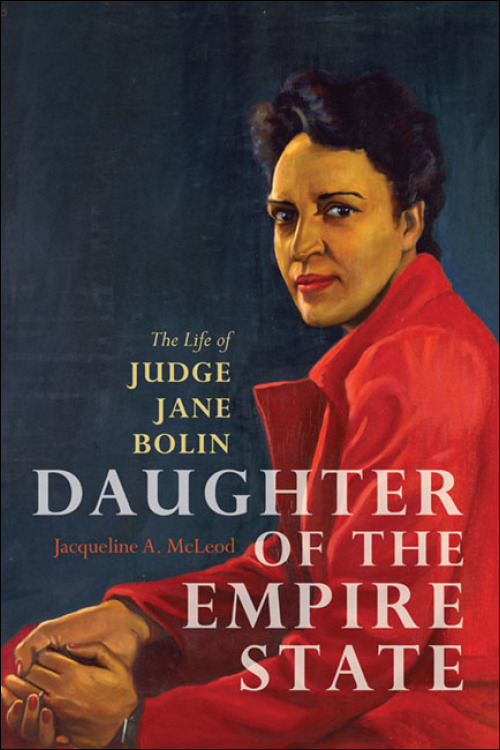Daughter of the Empire State: The Life of Judge Jane BolinPosted in Biography, Books, Law, Media Archive, Monographs, United States, Women on 2014-03-30 14:58Z by Steven |
Daughter of the Empire State: The Life of Judge Jane Bolin
University of Illinois Press
December 2011
168 pages
6 x 9 in.
4 black & white photographs
Cloth ISBN: 978-0-252-03657-6
Ebook ISBN: 978-0-252-09361-6
Jacqueline A. McLeod, Associate Professor of History and African & African American Studies
Metropolitan State College of Denver
The trailblazing work of the first African American woman judge
This long overdue biography of the nation’s first African American woman judge elevates Jane Matilda Bolin to her rightful place in American history as an activist, integrationist, jurist, and outspoken public figure in the political and professional milieu of New York City before the onset of the modern Civil Rights movement.
Bolin was appointed to New York City’s domestic relations court in 1939 for the first of four ten-year terms. When she retired in 1978, her career had extended well beyond the courtroom. Drawing on archival materials as well as a meeting with Bolin in 2002, historian Jacqueline A. McLeod reveals how Bolin parlayed her judicial position to impact significant reforms of the legal and social service system in New York.
Beginning with Bolin’s childhood and educational experiences at Wellesley and Yale, Daughter of the Empire State chronicles Bolin’s relatively quick rise through the ranks of a profession that routinely excluded both women and African Americans. Deftly situating Bolin’s experiences within the history of black women lawyers and the historical context of high-achieving black New Englanders, McLeod offers a multi-layered analysis of black women’s professionalization in a segregated America.
Linking Bolin’s activist leanings and integrationist zeal to her involvement in the NAACP, McLeod analyzes Bolin’s involvement at the local level as well as her tenure on the organization’s national board of directors. An outspoken critic of the discriminatory practices of New York City’s probation department and juvenile placement facilities, Bolin also co-founded, with Eleanor Roosevelt, the Wiltwyck School for boys in upstate New York and campaigned to transform the Domestic Relations Court with her judicial colleagues. McLeod’s careful and highly readable account of these accomplishments inscribes Bolin onto the roster of important social reformers and early civil rights trailblazers.
Table of Contents
- Preface
- Acknowledgments
- 1. Her Standing in Poughkeepsie: Family Lineage and Legacy
- 2. On Her Own: The Years at Wellesley and Yale
- 3. Politics of Preparation: The Making of the Nation’s First African American Woman Judge
- 4. Politics of Practice: An African American Woman Judge on the Domestic Relations Court
- 5. Speaking Truth to Power: A View from the Benchof Judge Jane Bolin
- 6. Persona Non Grata: Jane Bolin and the NAACP, 1931–50
- Epilogue
- Notes
- Index
